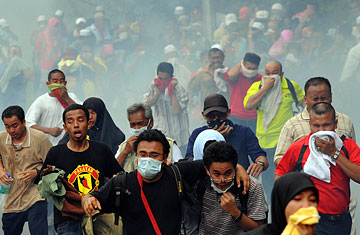
Demonstrators flee as Malaysian anti-riot police fire tear gas shells near Merdeka Square in Kuala Lumpur on August 1, 2009
Since coming into power in April, Malaysian Prime Minister Najib Razak has announced a slew of people-friendly policies. He made moves to liberalize the economy and improve simmering ethnic tensions by easing up on wealth ownership rules that had long-favored native Malays over the nation's significant Chinese and Indian minorities. The citizens those policies were aimed to please rewarded Najib with good numbers: In mid-July, public opinion polls showed the new PM with high approval ratings of 70%, compared to low ratings of 35% as deputy PM before taking office.
But on August 1, all those cozy feelings came under a cloud after Najib's government sent out over 3,700 police personnel to employ their batons, tear gas and chemical-laced water cannons to disperse an estimated 20,000 people who had marched in the capital to demand the repeal of the longstanding Internal Security Act (ISA) security law that is often used against political opponents. Over 500 people were arrested — the biggest mass arrest since the city's race riots in 1969 — and over 50 people have been charged with taking part in an illegal assembly, a crime punishable with two-years in prison if found guilty. Among those arrested were about 40 minors under the age of 18 years who were held overnight in police lock ups, whose parents National Police Chief Mr Musa Hassan has also vowed to charge under the Child Act for allowing them to take part in the protest. "We strongly condemn this over-zealous and abusive show of power to crush the people's right to assembly and free expression," Ragunath Kesavan, president of the Malaysian Bar Council, told TIME. "The new government appears determined to stifle public opinion, persecute and punish those who dare to speak out."
There has been signs that the nation's honeymoon with its new leader was coming to an end. In July, a former government minister who defected to the opposition had told local media that Mr Najib is an "iron fist in a velvet glove." The mayhem on Saturday, his critics are now saying, are a harbinger of worse things to come. The brutal display of force unfolded in the middle of a Saturday afternoon in central Kuala Lumpur as protesters marched to Istana Negara palace to ask King Mizan Zainal Abidin — whose role in Malaysia today is largely ceremonial — to repeal the ISA law. The law, under which detained persons can be held without trial for years under the act, was first enacted in 1948 to use against communist insurgents, but has always been abused. In September 2008, the ISA was resurrected to temporarily arrest a young journalist, a popular lawmaker and a blogger, sparking national outrage and prompting the opposition to annouce Saturday's protest a month ahead of the one year anniversary of the event.
Najib immediately defended this stringent call to order, saying the massive protest was orchestrated by his political rival, Anwar Ibrahim. Many have observed that Ibrahim, currently an MP who has weathered his own political storms in recent years, has been styling himself as the prime-minister-in waiting. "I have promised a review of the ISA," Najib told local media on Sunday. "They can protest in halls and stadiums but not on the streets." Police and government officials in Malaysia typically view street demonstrations as a challenge to their authority, whereas a gathering in a stadium or otherwise contained public space is considered a peaceful and legitimate show of dissent. The current opposition, however, says street demonstrations themselves are peaceful with police using force to disperse the crowd.
For his part, Najib had been doing okay until Saturday's mayhem, according to political analysts. After inheriting a ruling coalition in disarray and a government lacking firm direction amidst an economic slowdown, he had pulled the government together and give "hope of a fair, just and united society under his One Malaysia banner," says political scientist Denison Jayasooria. Mr Najib saw to it that more non-Malays were employed in the civil service, started several new, government-managed, big-sized unit trust schemes allowing non-Malay participation. He even allowed unsold portions of the units reserved for Malays, to be offered to non-Malays after a stipulated time.
But opposition lawmakers say this abrupt use of "brute force" against peaceful dissenters marks the end of Najib's brief honeymoon. "Saturday's message is clear...toe the line, or face brute force," says opposition MP Tian Chua. Jayasooria says the Prime Minister has not shown a respect for human rights, a commitment to tolerate dissent and see political opponents as partners in a democratic system. "The use of overwhelming force against peaceful dissenters is a serious indictment of his administration," says Jayasooria. August 5's raw display of force is also a far cry from the tolerant and liberal atmosphere inculcated by the fatherly former PM Abdullah Badawi, who was forced to resign in March for leading the ruling 13-party Barisan Nasional coalition to its worst ever performance in 2008 polls. The mysterious death of an opposition political aide in July has compounded critics' concerns. In mid-July Teoh Beng Hock, 30, was found dead beneath the 14th story window of the Malaysian Anti-Corruption Commission offfices after a late night interrogation by officers, sparking national outrage. Opposition lawmakers blame the death on the MACC and accuse the authorities of unleashing the commission against them. Veteran opposition lawmaker Lim Kit Siang is demanding a Royal Commission of Inquiry into all the circumstances leading to Mr Teoh's death. "The people are entitled to know the whole truth," he told TIME.
An inquest is on-going and Najib has agreed to set up a Royal Commission of Inquiry but after the on-going inquest is over. The results of the inquest and inquiry are unlikely to stop the rising political temperature in the country.
